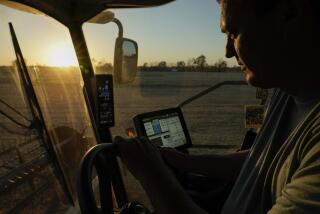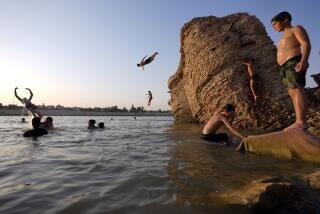Drought takes toll on Iraqi farmers
HAWIJA, IRAQ — For nearly three years, farmer Sarheed Ahmed barely touched his land. He was too afraid of drawing the attention of the masked gunmen who terrorized the area, or of the U.S. attack helicopters that prowled overhead.
Now, Ahmed says, he can farm until late at night without worrying about safety. But in a cruel twist, the rain didn’t come this season.
After struggling through five years of war, Iraq is facing an acute drought, which has slashed agricultural production and threatens to decimate livestock. In the worst-hit northern provinces, areas that were covered with golden wheat fields and verdant pastures have become a dust bowl.
For communities such as Hawija, a northern farming town that is just beginning to emerge from fighting that pitted U.S. and Iraqi forces against Sunni Muslim militants, the drought could hardly have hit at a worse time. How it is managed will test a government weighed down by bureaucracy, corruption and distrust.
Agriculture is Iraq’s largest employer, accounting for the livelihoods of 25% to 40% of the workforce. If production can be boosted, U.S. officials believe, the sector could become an engine for stability. But drought hardships could drive some people back into the arms of insurgents with cash at hand for anyone willing to plant a bomb.
“Ninety percent of the people in Hawija live off farms,” said Mohammed Hussein, a mayor in the area. “If the farmer can’t work his land, he will have no choice but to be a terrorist to support his family.”
The fertile plains between the Tigris and Euphrates rivers are among the places where farming was pioneered about 10,000 years ago. But the rest of Iraq is largely arid, leaving farmers vulnerable to erratic rains.
The rainfall last winter, when the country receives most of its precipitation, was about 30% of the average, according to the Water Resources Ministry. During the key planting period from October to December, many regions received no measurable rainfall.
Iraq has survived worse droughts. But the effects are particularly severe now because reservoir and river levels are also low after several years of reduced rainfall, Agriculture Minister Ali Bahadili said in a telephone interview.
“This is a very hard time,” he said.
Water levels are also affected by dams in Turkey, Syria and Iran, and Iraqi officials accuse their neighbors of taking more than their fair share. However, those countries also have been hurt by the drought.
Irrigation canals crisscross Hawija, but the water level is controlled by the Dukan Dam in the semiautonomous ethnic Kurdish region to the north.
Many of the mostly Sunni Arab farmers in Hawija were convinced that the Kurdish regional authority in Irbil was deliberately holding back water until U.S. officers brought them photographs showing that the dam’s reserves had dropped by 10 billion gallons.
U.S. officials say it is a problem of conflicting priorities. The Kurdish region uses the dam to generate electricity. So it stores water in the spring, when it is most needed by farmers, to build reserves for the hot summer, when demand for power peaks.
“We talked to everyone in the government in Baghdad, Irbil and Kirkuk about this problem, but no one is listening to us,” said the chairman of the Hawija district council, who asked to be identified by a traditional nickname, Abu Saddam. “The people in the north of Iraq . . . don’t care about the farmers in Iraq.”
Sunni militants preyed on such disaffection to gain a foothold in Hawija, a strategic crossroads between the oil-rich provincial capital, Kirkuk, and the refinery town of Baiji. And U.S. officers worry that mounting frustration could again become a catalyst for violence.
“It’s the most secure it’s been, but at some point the newness and novelty of that wears off, and people start expecting something else,” said Maj. Brian Tuson of the Army’s 1st Battalion, 87th Infantry Regiment. “If they perceive the government to be unresponsive to what they see as reasonable demands, that could backslide.”
Hawija’s canals filled for the first time this season on the day that Ahmed began harvesting a paltry and stunted winter wheat crop.
He has a well, which provided enough water to plant half his 37-acre field. But that won’t be sufficient to support the 45 people who live off the farm. So Ahmed also works as a neighborhood guard, part of a U.S. military program that has helped drive militants out of some of Iraq’s most violent places.
“We couldn’t farm before because we were scared all the time,” said Ahmed, a hefty man in a worn brown tracksuit and dark sunglasses. “Now, I can work all night, if I want to. We have all the freedom, but there is no water, no fertilizer, nothing.”
Ahmed’s neighbor, who didn’t have a well, wasn’t able to plant a thing this year. His field is a dry and cracked wasteland studded with weeds.
U.S. officials forecast that about 2.5 million acres of wheat will be harvested this season, nearly 50% less than last year. In the northern provinces of Tamim, Nineveh and Irbil, where farmers rely heavily on rain to water their crops, the amount is expected to drop as much as 80%.
The effect on the barley crop, which herders feed to their sheep, has been even worse. Many farmers have been forced to sell some of their animals to buy feed for the rest.
Nearly 4,000 sheep were on offer recently at the livestock market in the northern Kurdish town of Maidan, where buyers and sellers haggled amid swirling clouds of dust, kicked up by the bleating animals.
Rasheed Tahir had brought 250 of his 400 sheep to sell that day, but was disappointed by the prices, which have dropped about 50% this year.
“My relationship with my sheep goes back a long time,” he said glumly. “I used to care for them like a father would his children. . . . But because of the drought, I have no choice but to sell them.”
The effects won’t be confined to this season. Farmers hold back a portion of their harvest to use as seed for the next crop. But because production is down, many will have little or nothing to plant and no money to purchase seed.
Bahadili, the agriculture minister, said the government would take steps to help farmers, including digging more wells and subsidizing the cost of seed, animal feed, fertilizer and pesticides. But farmers said they had heard such promises before.
U.S. officials blame the sluggish government response on a combination of bureaucratic malfunction, corruption and lingering insecurity in some areas, where Iraqi officials refuse to travel.
Ahmed, a Sunni, said he expected nothing from the Kurdish-dominated provincial authorities in Kirkuk or the Shiite-led government in Baghdad. The future, he said, “is in God’s hands.”
--
Times staff writers Caesar Ahmed and Raheem Salman in Baghdad and special correspondent Asso Ahmed in Maidan contributed to this report.
More to Read
Sign up for Essential California
The most important California stories and recommendations in your inbox every morning.
You may occasionally receive promotional content from the Los Angeles Times.










